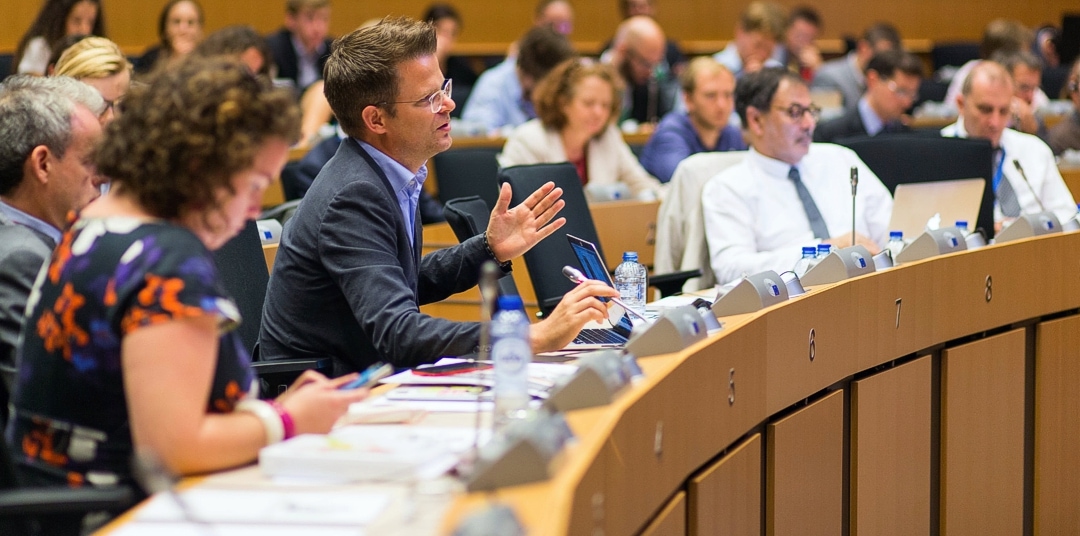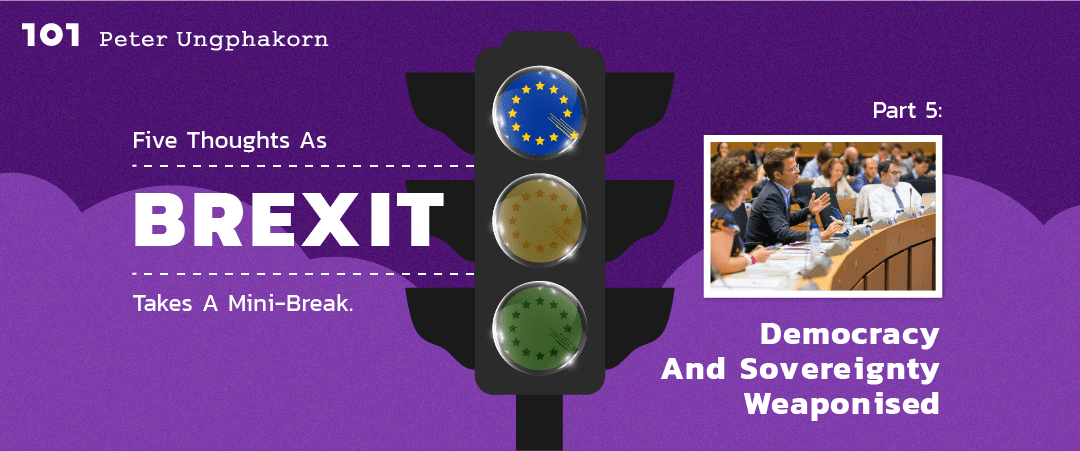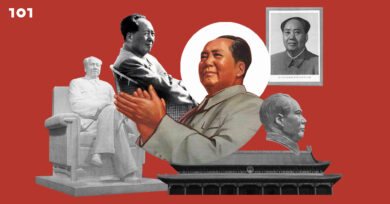Peter Ungphakorn Story
Papimol Lotrakul Illustration
[box]
Brexit has almost completely dominated British politics. Now a strange calm has interrupted months of hectic activity, but it won’t last long. Peter Ungphakorn considers five lessons learnt so far. Part 5: democracy and sovereignty weaponised
[/box]
For months, the United Kingdom’s chaotic efforts to set up its departure from the European Union (Brexit) saw almost daily twists and turns. Tension mounted and the British moved ever closer to crashing over the cliff-edge and out of the EU, with only the flimsiest of parachutes.
This is the last of five parts on thoughts on what happened in the last couple of years and on what lies ahead. Several have been discussed before. They all contain new developments:
- after all the frantic to-ing and fro-ing, almost nothing has changed for Britain
- nearly three years of political debate has failed to produce better-informed arguments
- if those past three years were bad, what lies ahead is going to be worse
- Theresa May’s handling has been disastrous but she might still get what she wants — just
- simplistic definitions of democracy and sovereignty are unhelpful
5. What exactly does ‘undemocratic’ mean?
The way people use two slogans is a good measure of how little they are listening to each other: “democratic” and “sovereignty”. They are used as absolutes, as an excuse to avoid thinking more deeply.
The call for a new referendum has three related motives:
- to reverse the 2016 referendum and for the UK to stay in the EU — it took only a few weeks mainly in March 2019, for a record six million people to sign an online petition lodged with the UK Parliament to revoke Article 50 and scrap Brexit completely
- to test whether the public like May’s Withdrawal Agreement (or a new one if the government and opposition can agree), compared with either “no deal” or staying in the EU or both
- to break the deadlock where the government and Parliament are failing.
Remainers naturally accept all three arguments. Most Leavers see all three as undemocratic because it would be a denial of the 2016 vote. In a democracy, voters are allowed to change their minds, counter the Remainers. That’s an insult to leave voters, is the response. And so the debate continues, round and round, in circles.
Strictly speaking, only the first motive might be for a “second referendum” (“third” if you also count one in 1975). Arguments for it include how much more information is now available than in 2016.
The implied question is: If you knew then what you know now would you still vote to leave? According to opinion polls “remain” might now win with a narrow margin. It’s unclear how much of that is because people have changed their minds, and how much is because new young voters have become eligible.
Added to this is the charge that the two main organisations promoting “leave” cheated or conducted unethical campaigns by breaking spending limits, at least one leading to criminal investigation, using funds of dubious origin, faking evidence to stoke up anti-immigration sentiment, secretly seeking support from extreme right-wing groups, and using other sophisticated, underhand and possibly illegal social media techniques related to companies such as Cambridge Analytica.
This has added more fire to the debate, with supporters of a second referendum claiming the first was illegitimate, and opponents arguing that voters knew what they were voting for. Leavers also charge the campaign for a second referendum with receiving money from billionaire financier George Soros. The group he helped, Best for Britain, says the donations it receives are above-board.
The second and third motives are different. One would test public support for an actual agreement, rather than the abstract concept of leaving. The other would try to break the deadlock — whether it would succeed is another matter.
The question of whether a second referendum would be democratic is just the tip of the iceberg. One of the complaints of leavers is that the EU itself is undemocratic, a slogan that sticks, despite the irony that Britain now finds itself in a democratic election for the European Parliament.
Two other institutions also run the EU. One is the Council, which consists of heads of governments or ministers (depending on the agenda) from the member states, all chosen democratically.
Critics of the EU who complained that member states like Britain had no say, now find that the terms of its departure are being debated by those EU member states. The new October 31 deadline for the UK’s exit was a compromise between Emmanuel Macron of France and Angela Merkel of Germany (plus some others).
The other is the Commission, a bureaucracy criticised for having too much power. And yet the commissioners (equivalent to ministers) are appointed by those (democratic) member states and vetted by the European Parliament. Increasingly the commission’s work has to be directed by the Council and endorsed by the parliament.
It’s one thing to say the EU’s democracy is flawed (where in the world is democracy not flawed?). It’s quite another to say the EU is undemocratic.
If the “undemocratic” argument is difficult to defend — and even so, many people do — a favourite dodge is to claim the UK has lost “sovereignty” to the EU. By leaving, it is reclaiming sovereignty, “taking back control”.
Sovereignty is much more abstract. It’s not defined by activities such as voting. It is closely related to identity. And it appeals to patriotic sentiments.
But sovereignty is not really black-and-white, and the arguments have their contradictions. The biggest one is the rejection of identical arguments when Scottish and Welsh nationalists want to reclaim sovereignty for themselves.
Whenever a country signs an international treaty it is agreeing to give up some of its freedom of policy — its sovereignty — for some shared benefit. That’s true of security, disarmament, human rights, the law of the sea, trade, climate change and much more.
The idea behind groups like the EU is close cooperation and shared sovereignty in specific areas, for peace and prosperity.
Sadly the Brexit debate just turns democracy and sovereignty into weapons, the simplest of slogans used to shoot down counter-arguments. That won’t help the Brexit process either.
__________________________
Previously: Is the Prime Minister the problem?
Return to part 1: Red Queen Theresa’s race
__________________________
Find out more
- Article 50 two years on (The UK in a Changing Europe, 2019)
- Negotiating Brexit: Preparing for talks on the UK’s future relationship with the EU (Institute for Government, 2019)
- Brexit: A Love Story? (Audio — a highly recommended series of BBC Radio Four podcasts, 2018–19)
__________________________
Previous articles on Brexit
- And I leave you with Brexit (again), as it heads into ever darker hours (December 21, 2018)
- Five days of mathematical impossibility in the parallel universe of Brexit (October 19, 2018)
- When complexity challenges public opinion and democracy. Part 3—Brexit, two years later (June 22, 2018)
- Can a UK-EU Brexit deal really emerge from this chaos? (June 27, 2017)
See also the author’s blog
Peter Ungphakorn is based on the shores of Lake Léman in Switzerland. He spent almost two decades with the WTO Secretariat, Geneva. Before that he worked for The Nation and the Bangkok Post. He now writes for IEG Policy on agricultural trade issues and blogs on trade, Brexit and other issues at https://tradebetablog.wordpress.com/. He tweets @CoppetainPU.



